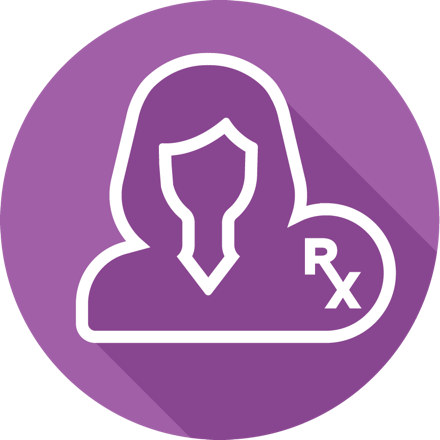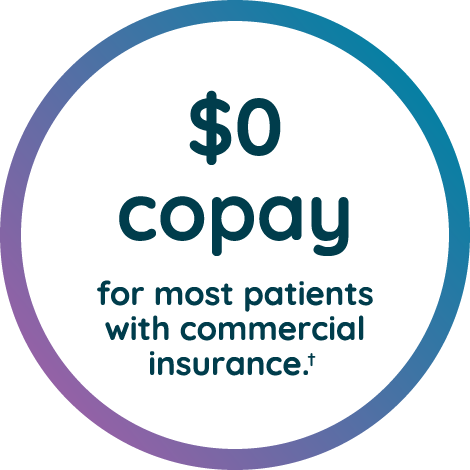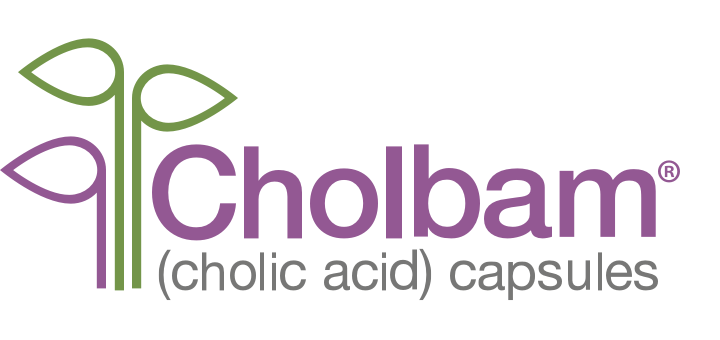
CHOLBAM® (cholic acid) Total Care HUB* for total support
Providing personalized support for you and your patients
*CHOLBAM® is a registered trademark of Mirum Pharmaceuticals, Inc. Total Care HUB® is a transitional service provided by and a registered trademark of Travere Therapeutics, Inc.

CHOLBAM® is a registered trademark of Mirum Pharmaceuticals, Inc. Total Care HUB® is a transitional service provided by and a registered trademark of Travere Therapeutics, Inc.
We understand that living with a rare disease, such as peroxisomal biogenesis disorder-Zellweger spectrum disorder (PBD‑ZSD), can be challenging for patients. That’s why we provide support for them through the CHOLBAM Total Care HUB.
The Total Care HUB is a support program for your patients taking CHOLBAM and their caregivers. When you prescribe CHOLBAM to your patients, they are automatically enrolled in the program and will be assigned a dedicated team of professionals to assist them throughout their treatment.
Your patients who are enrolled in the program and their caregivers can call the HUB 24 hours a day, 7 days a week, at 844‑CHOLBAM (844‑246‑5226).
The Total Care HUB provides:

Clinical Nurse Coordinators
- Help your patients and their caregivers understand PBD‑ZSD.
- Provide patients and caregivers with tips to help manage treatment.
- Communicate patient needs to you.

Pharmacists
- Ensure that your patients’ prescriptions are accurately dispensed.
- Answer patient and caregiver questions about dosing and treatment regimen.

Patient Services Coordinators
- Are your patients’ and their caregivers’ main point of contact.
- Provide live support to keep patients on track with their treatment plan.
- Offer support with questions or issues your patients and caregivers may have with insurance.
- Inform on available patient assistance programs if your patient is under-insured or has no insurance.
- Give help with copays for commercial insurance.*
- Coordinate your patients’ monthly prescription refills and send them reminders.
- Arrange for delivery of medication directly to your patients’ doorstep.

†Copay Terms and Conditions:
- Program is valid for patients with commercial or private insurance.
- Must be a US resident.
- Not valid for patients insured by a federal or state government-funded health plan, including Medicare, Medicare Advantage, Medicaid, and TRICARE.
- Void where the program is prohibited by law.
- Not valid for uninsured patients.
- Program does not replace prescription drug coverage or insurance and is not intended to substitute for coverage.
- Mirum Pharmaceuticals reserves the right to terminate or modify this program at any time without notice.

CHOLBAM® is a registered trademark of Mirum Pharmaceuticals, Inc. Total Care HUB® is a transitional service provided by and a registered trademark of Travere Therapeutics, Inc.
Enroll your PBD‑ZSD patients in this valuable program
INDICATION
CHOLBAM® (cholic acid) is a bile acid indicated for- Treatment of bile acid synthesis disorders due to single enzyme defects.
- Adjunctive treatment of peroxisomal disorders, including Zellweger spectrum disorders, in patients who exhibit manifestations of liver disease, steatorrhea, or complications from decreased fat-soluble vitamin absorption.
LIMITATIONS OF USE
The safety and effectiveness of CHOLBAM on extrahepatic manifestations of bile acid synthesis disorders due to single enzyme defects or peroxisomal disorders, including Zellweger spectrum disorders, have not been established.IMPORTANT SAFETY INFORMATION
WARNINGS AND PRECAUTIONS – Exacerbation of liver impairment
- Monitor liver function and discontinue CHOLBAM in patients who develop worsening of liver function while on treatment.
- Concurrent elevations of serum gamma glutamyltransferase (GGT) and alanine aminotransferase (ALT) may indicate CHOLBAM overdose.
- Discontinue treatment with CHOLBAM at any time if there are clinical or laboratory indicators of worsening liver function or cholestasis.
ADVERSE REACTIONS
- The most common adverse reactions (≥1%) are diarrhea, reflux esophagitis, malaise, jaundice, skin lesion, nausea, abdominal pain, intestinal polyp, urinary tract infection, and peripheral neuropathy.
DRUG INTERACTIONS
- Inhibitors of Bile Acid Transporters: Avoid concomitant use of inhibitors of the bile salt efflux pump (BSEP) such as cyclosporine. Concomitant medications that inhibit canalicular membrane bile acid transporters such as the BSEP may exacerbate accumulation of conjugated bile salts in the liver and result in clinical symptoms. If concomitant use is deemed necessary, monitoring of serum transaminases and bilirubin is recommended.
- Bile Acid Binding Resins: Bile acid binding resins such as cholestyramine, colestipol, or colesevelam adsorb and reduce bile acid absorption and may reduce the efficacy of CHOLBAM. Take CHOLBAM at least 1 hour before or 4 to 6 hours (or at as great an interval as possible) after a bile acid binding resin.
- Aluminum-Based Antacids: Aluminum-based antacids have been shown to adsorb bile acids in vitro and can reduce the bioavailability of CHOLBAM. Take CHOLBAM at least 1 hour before or 4 to 6 hours (or at as great an interval as possible) after an aluminum-based antacid.
PREGNANCY
No studies in pregnant women or animal reproduction studies have been conducted with CHOLBAM.LACTATION
Endogenous cholic acid is present in human milk. Clinical lactation studies have not been conducted to assess the presence of CHOLBAM in human milk, the effects of CHOLBAM on the breastfed infant, or the effects of CHOLBAM on milk production. The developmental and health benefits of breastfeeding should be considered along with the mother’s clinical need for CHOLBAM and any potential adverse effects on the breastfed infant from CHOLBAM or from the underlying maternal condition.GERIATRIC USE
It is not known if elderly patients respond differently from younger patients.HEPATIC IMPAIRMENT
- Discontinue treatment with CHOLBAM if liver function does not improve within 3 months of the start of treatment.
- Discontinue treatment with CHOLBAM at any time if there are clinical or laboratory indicators of worsening liver function or cholestasis. Continue to monitor laboratory parameters of liver function and consider restarting at a lower dose when the parameters return to baseline.

